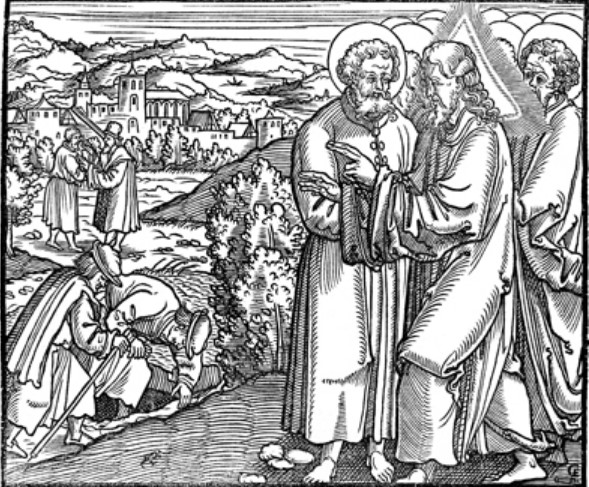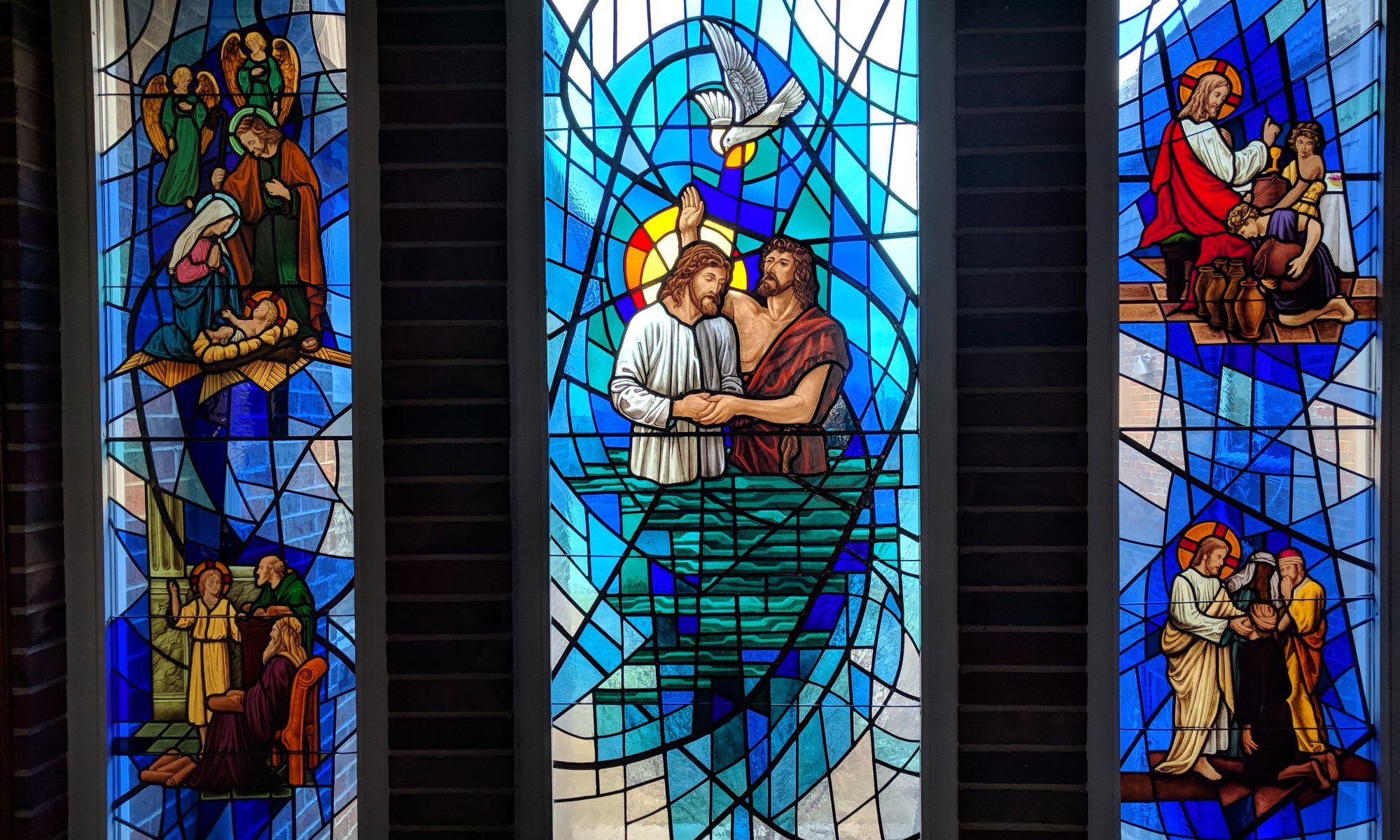
Lessons: Genesis 50:15-21, Romans 12:14-21, Luke 6:36-42
Hymns: LSB 496, 696, 627, 845, 649
Grace, mercy, and peace to you from God our Father and our Lord and Savior, Jesus Christ. Amen.
When teaching the Christian faith in Catechism classes for both young and old, we examine numerous Bible passages. Usually, we look a couple of verses to support each Christian teaching. That way we know the teaching is God’s teaching and not man’s opinion. The explanation of the Small Catechism—that is, that really long section with hundreds of questions—is filled with hundreds of these Bible passages. They are a goldmine of Scripture references all nicely laid out and organized so we can find quickly where God teaches us certain things. So if you want to know the Bible passages that support the Holy Trinity or the reality that Jesus is true God and true Man, you may look at the section on the Creed. Or if you want to know the passages to forgive your neighbor, you will look under the Fifth Petition in the Lord’s Prayer, “Forgive us our trespasses as we forgive those who trespass against us.”
One criticism of having short passages to support Christian teachings is that it may be easy to take those passages out of context. For example, I heard one of our previous national presidents explain that we are to help others, for we are our brother’s keeper. It is true, the Scriptures teach us much about helping others. But the only time the Bible uses the language about being our brother’s keeper is after Cain killed his brother Abel. The Lord visited Cain and asked him, “Where is your brother?” Cain flippantly replied to God, “I do not know; am I my brother’s keeper?” (Gen. 4:8-11). So perhaps we ought to avoid this language if we want to prove our Christian identity or purpose.
Today’s Gospel is also taken out of context quite frequently. In fact, a friend shared an image with me depicting the way today’s Gospel is commonly read. All the words in our Gospel lesson are scribbled out except for just two words, “Judge not.” It’s quite ironic that this passage is taken out of context, especially when Jesus asks, “Can the blind lead the blind?” and then says, “First, take the log out of your own eye, and then you will see clearly to take the speck that is in your neighbor’s eye” (Luke 6:39-42). When we close our eyes to everything Jesus says around the words, “Judge not,” then we will almost certainly acquire a false understanding of what Jesus is truly teaching here, becoming blind and then possibly leading the blind.
We often treat these words of Jesus as an excuse to keep on sinning. We feel we can use these words of Jesus as leverage to tell anyone who says we need to repent and turn from this or that sin to leave us alone, for Jesus says, “Judge not.” We defend our sinful choices, saying things like, “Who made you judge over me?” or “You’re not perfect either.”
Now, it is true none of us are perfect. The Scriptures clearly state that all have sinned and fall short of the glory of God (Rom. 3:32).
And sometimes it is true that others are not to be our judges. This is a matter of jurisdiction. God places certain people in authority and gives them the right to judge others. Parents have authority over their children and can judge them. In fact, they do it all the time as they work to stop bad behavior and model good behavior for their children. No child can respond to their parents’ correction, saying, “Don’t you remember Jesus words, ‘Judge not?’” Parents have the God-given right to discipline their children. In the same way, teachers have authority in their classrooms, pastors in their congregations, and law enforcement and judges in society.
In fact, teaching what is right and wrong is not judging. Telling people sin is a sin when God teaches it is a sin is not judging. We are not judging when we are simply teaching the Ten Commandments. We are, however, judging when we prescribe punishments for sin. That’s when we can only do so when we have the proper jurisdiction.
So if you tell others what the Bible says, like “Don’t fornicate, don’t steal, or don’t gossip” and they say, “Judge not” in a feeble attempt to let themselves off the hook, you may reply, “I’m not judging. I’m repeating God’s Word. I care about you. I want you to enjoy the freedom Christ Jesus gives when He releases you from sin by forgiving you and reconciling you to God our Father. I want you to turn from your sin so that you are on the path to eternal life.” When this is our mindset, we are approaching others with repentant hearts, seeking repentant hearts. These are exercises in mercy, as Jesus first teaches in our Gospel.
Jesus is, of course, the Merciful One. For when God saw us in our sinful condition with no way for us to atone for our sins, Jesus paid for them all on the cross. He accepted responsibility for our many sins, bore our sins in His Body, and shed His innocent Blood as the ransom payment for our sin. He now credits us with His very righteousness. He opened Heaven to us. He counts us as His brothers and sisters. He delights in receiving us as members of His family. He does all of this in mercy, despite our sinful nature and constant sinning and rebelling.
There is no one more merciful that our Lord. And yet, our Lord Jesus Christ will come back to judge. The very One who said, “Judge not” will be our Judge. Does this make Him a hypocrite, for saying one thing and doing another? Of course not. For our Lord’s judgments are not only just, but they are also way beyond fair. The judgment we all deserve for our sin is that we are guilty and should be condemned to an eternity in Hell. But because Jesus accepted responsibility for our sin and already paid for our sin on the cross, the judgment Jesus will render toward us Christians on the Last Day will be “Not guilty!” He will declare us innocent of all wrongdoing! That is mercy!
This also helps us understand what Jesus means when He says, “Condemn not” and “Forgive.” Jesus will not condemn anyone who becomes a child of God through Baptism and remains a member of His Kingdom through faith. Jesus forgives all who belong to Christ’s Church. And so, we follow suit. Instead of lashing out at others because of the ways they may have hurt us, we have mercy on them and forgive them.
We find ourselves judging quite frequently in various uncharitable and unmerciful ways. Many people are quick to say of those criminals who make the 10 o’clock news, “I sure hope God has reserved a special place in Hell for them!” This is exactly the kind of judging Jesus forbids. We have no jurisdiction over them, and instead we should be praying for their conversion to Christianity. We are often quick to criticize others, not liking their mannerisms. When searching for a church home, we often judge the way people treat us, what we think of the pastor, and even the condition of the house of worship. God would have us judge churches in a different way—to match what is preached with Scripture—to judge the faithfulness of the proclaimed Word. If a preacher is in error, he needs to be corrected.
Often our judgments are not rooted in mercy. Yet, at the same time, we often want others to overlook our own faults and failures. That’s why Jesus continues to teach in His sermon as recorded in Luke 6 by way of a parable. Jesus asks, “Can the blind lead the blind?” What person who cannot see because he has a plank in his eye is of use to the next blind person who cannot see because he has a speck in his own eye? How can the man blinded by the plank lead the man blinded by the speck? They will both fall into a pit.
And that is what often happens. Instead of seeking guidance by God’s Word, many are looking to the world for their source of truth. When they see the world accepts cohabitation, divorce, same-sex marriage, abortion, crossdressing, and a host of other sins, they figure they are now enlightened—that they see clearly the way it ought to be. Many churches even think they are led by the Holy Spirit when they depart from the Bible’s teachings and go along with the world on these matters or other doctrinal issues such as creation, the Flood, who may be pastors, or who can come to the Communion rail. But they have become blind, being led by the blind. Whenever we want to make claims contrary to Scripture, perhaps citing we’re in the 21st century, we are becoming blind, being led by the blind.
We should never consider ourselves enlightened because we have learned the ways of the world. The world is in darkness; only the Word of God truly illuminates us. We learn what is sinful in the Bible. And we learn what is truly good in the Bible. For the Bible is God’s Word and it constitutes the sole source of any legitimate Christian teaching.
The clarity God provides in Scripture is what we need. Without the Gospel, none of us could be saved. Without Jesus, none of us can be reconciled to God. Without hearing of Christ’s dying, bleeding love, none of us would know the true, merciful, forgiving nature of God. We would all want to flee from our Lord.
But through the clarity provided by the Holy Bible, we know God is love, He sent His only begotten Son to pay for our sins, and He grants eternal salvation to all who believe in Him. We are rescued from sin and death. We are covered with the very righteousness of Christ and declared innocent to receive everlasting life. We learn of the true nature of God—that He is not ready to send us straight to Hell, but He wants to receive us into the gates of Paradise.
This is who your God is. He’s the only God—Father, Son, and Holy Spirit. He loves us. He’s present to bless us. He hears our prayers. He will judge Christians righteous on the Last Day. He takes all our sin away. He is truly the Merciful One. Amen.
The peace of God which passes all understanding keep your hearts and minds in Christ Jesus to life everlasting. Amen

